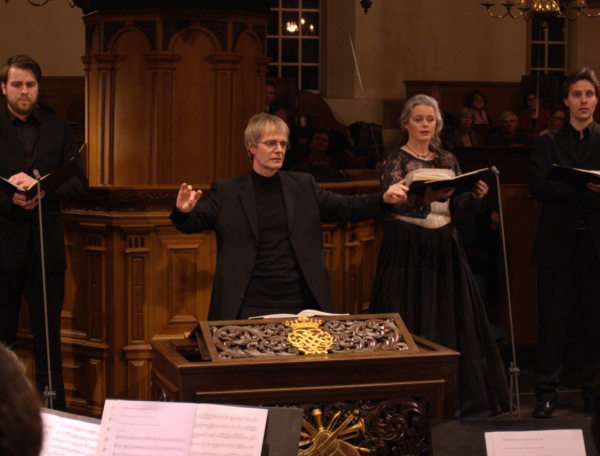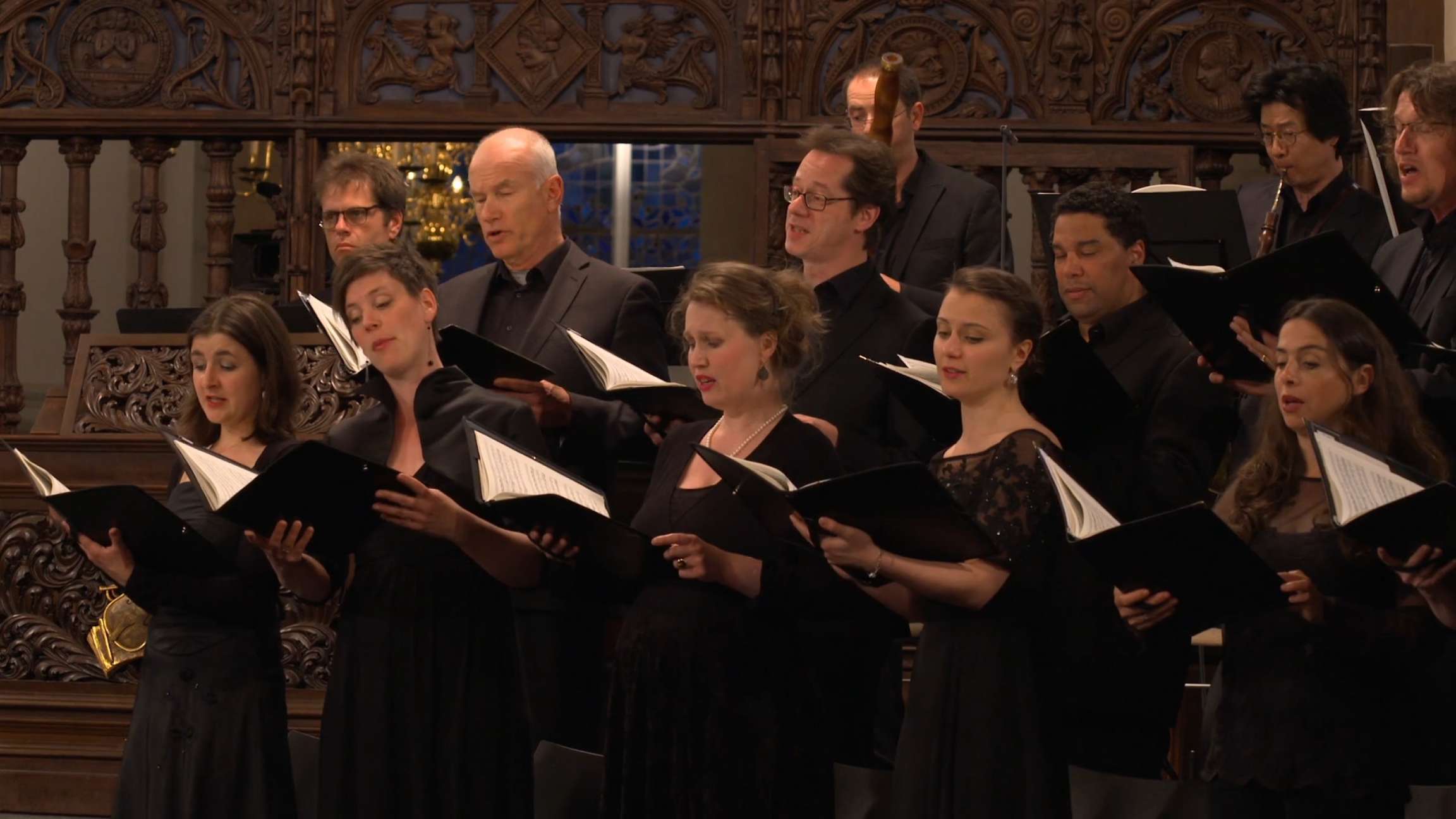

Fürchte dich nicht, ich bin bei dir
BWV 228 performed by the Netherlands Bach Society
conducted by Stephan MacLeod
Grote Kerk, Naarden
Behind the music
I can do better
Is Bach checkmating his father-in-law here?
It would of course be nice if we could confirm that Bach composed this motet in 1726 for the funeral of the wife of Stadthauptmann Winckler. Then this work for double choir could be added to the other motets that Bach composed in Leipzig, often on commission from private individuals. However, there are indications that Fürchte dich nicht was written much earlier. It bears a strong resemblance to another motet by Bach, Ich lasse dich nicht, BWV Anh159, which dates from 1712-13.
Furthermore, the structure of Fürchte dich nicht shows strong similarities to a motet by Johann Michael Bach, the father of Bach’s first wife and the leading motet specialist of his day. His Christmas motet for double choir, entitled Fürchtet euch nicht, is broken up into two parts, just like Bach’s Fürchte dich nicht. Each part opens with double choir and with a text taken from the Bible. Halfway through both motets, the choirs come together, after which the soprano switches to a very different text, swaying on a fugue-like base that is distributed over the three lower voices and which continues the biblical words.
The big difference is that in his placid motet (the words to the shepherds taken from the Gospel of Luke are: ‘Fear not, for I bring tidings of great joy’), Johann Michael links the jubilant Christmas message to the equally cheerful Lutheran chorale ‘Gelobet seist du, Jesu Christ’. Johann Sebastian, on the other hand, opts for a much greater complexity in his Fürchte dich nicht. In the biblical text, taken from Isaiah, he emphasises the doubts and fears of the believer. By contrast, the comforting words of Paul Gerhardt’s chorale ‘Warum solt ich mich denn grämen’, sung by the soprano, thus stand out even more starkly.
At the end of 1707, Bach married Johann Michael Bach’s daughter Maria Barbara. In this period, he was still strongly guided by what his predecessors had written – preferably trying to checkmate them with a compositional masterpiece. Of course we cannot know for certain, but it would be just like the young Bach to write a wonderful motet like this as a somewhat dubious tribute to his new father-in-law.
Motets, BWV 225-231, 118 and Anh159
Cantatas were Bach’s daily bread and a regular part of his weekly tasks as Cantor of St Thomas’s. His motets were a different case entirely. Apart from the cantata, hardly any new music was played in Leipzig (music was selected instead from the motet collection Florilegium Portense). This gave Bach scope for writing commissioned works for private occasions, often funerals. Unfortunately, probably dozens of these works have been lost. The pieces that did survive have stayed on the repertoire since their composition, unlike Bach’s other vocal works.
The surviving authentic motets – nine works, although research continues – build on a genre with an impressive pedigree. Against the background of strict Renaissance polyphony, the generation of Schütz (1585-1672) borrowed elements from the opulent, polychoral works of Giovanni Gabrieli and gave them a Central-German, Lutheran twist. In Bach’s case, too, the content focused on chorales and biblical passages, whereby worldly madrigalism (or put simply: portraying the words) served only to reinforce the expression of the religious genre.
- BWV
- 228
- Title
- Fürchte dich nicht, ich bin bei dir
- Genre
- motets
- Year
- ca. 1707? / 1726
- City
- Mühlhausen/Weimar/Leipzig
- Lyricist
- "Verses 1 and 2 taken from Isaiah 41:10 and 43:1; verses 3 and 4 taken from Paul Gerhardts chorale Warum solt ich mich denn grämen (1653)
- Occasion
- Unknown
- First performance
- Unknown
Extra videos
Vocal texts
Original
Fürchte dich nicht, ich bin bei dir;
weiche nicht, denn ich bin dein Gott!
Ich stärke dich, ich helfe dir auch,
ich erhalte dich durch die rechte Hand
meiner Gerechtigkeit.
Fürchte dich nicht,
denn ich habe dich erlöset,
ich habe dich bei deinem Namen gerufen,
du bist mein!
Herr, mein Hirt, Brunn aller Freuden,
Du bist mein, ich bin dein,
niemand kann uns scheiden.
Ich bin dein, weil du dein Leben
und dein Blut mir zugut
in den Tod gegeben.
Du bist mein, weil ich dich fasse,
und dich nicht, o mein Licht,
aus dem Herzen lasse.
Lass mich, lass mich hingelangen,
da du mich und ich dich
lieblich werd umfangen.
Translation
Fear not, for I am with thee
be not dismayed, for I am thy God.
I will strengthen thee and help thee,
I will uphold thee with the right hand
of my righteousness.
Fear not,
for I have redeemed thee,
I have called thee by thy name;
thou art mine.
Lord, my shepherd, fount of all joys!
Thou art mine, I am thine,
no one can part us.
I am thine, for thou hast given
thy life and thy blood
for my sake in death.
Thou art mine, for I embrace thee,
and will not, O my light,
let thee from my heart!
Let me, let me attain
to where thou me and I thee
may lovingly embrace.
Credits
-
- Release date
- 2 December 2016
-
- Recording date
- 14 May 2016
-
- Location
- Grote Kerk, Naarden
-
- Conductor
- Stephan MacLeod
-
- Soprano
- Orlanda Velez Isidro, Klaartje van Veldhoven, Griet de Geyter, Aleksandra Lewandowska, Marjon Strijk, Hilde van Ruymbeke, Stephanie Pfeffer, Marta Paklar
-
- Alto
- Barnabás Hegyi, Gemma Jansen, Elena Pozhidaeva, Bernadett Nagy, Marine Fribourg, Victoria Cassano McDonald
-
- Tenor
- Adriaan de Koster, Wolfgang Frisch, Guy Cutting, Diederik Rooker, Immo Schröder, Ronald Threels
-
- Bass
- Matthew Baker, Sebastian Myrus, Pierre-Guy Le Gall White, Martijn de Graaf Bierbrauwer, Michiel Meijer, Jelle Draijer
-
- Violin
- Shunske Sato, Sayuri Yamagata
-
- Viola
- Staas Swierstra
-
- Cello
- Lucia Swarts
-
- Violone
- Robert Franenberg
-
- Oboe 1
- Martin Stadler
-
- Oboe 2
- Peter Frankenberg
-
- Taille
- Yongcheon Shin
-
- Bassoon
- Benny Aghassi
-
- Organ
- Pieter-Jan Belder
-
- Harpsichord
- Siebe Henstra
-
- Director
- Simon Aarden
-
- Assistant director
- Ferenc Soetman
-
- Music recording
- Guido Tichelman, Bastiaan Kuijt, Micha de Kanter
-
- Music edit and mix
- Guido Tichelman
-
- Camera
- Bart ten Harkel, Merijn Vrieling, Merlijn Dielemans, Chris Reichgelt, Martijn Struijf
-
- Lights
- Zen Bloot
-
- Lighting assistant
- Patrick Galvin
-
- Video engeneer
- Niels Cnossen
-
- Set technique
- Marco Korzelius
-
- Data handling
- Jesper Blok
-
- Project manager nep
- Peter Ribbens
-
- Interview
- Beitske de Jong, Gijs Besseling
-
- Producer
- Marco Meijdam
Discover
Help us to complete All of Bach
There are still many recordings to be made before the whole of Bach’s oeuvre is online. And we can’t complete the task without the financial support of our patrons. Please help us to complete the musical heritage of Bach, by supporting us with a donation!

